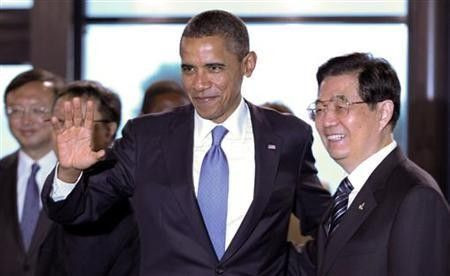China looks across Asia and sees new threats

Heads of government attending Asian summits hoping to fathom China's foreign policy mood swings might spare a thought for Beijing's own leaders, who fear their expanding influence is attracting a new circle of potential foes not fans.
China's diplomacy throughout 2011 has stressed the ruling Communist Party's desire to set aside recent regional feuds as it focuses on a leadership handover next year.
Beijing has sought to rein in tensions with Vietnam and the Philippines over the South China Sea and avoided ire over Japan's recent arrest of a Chinese boat captain in Japanese waters. And, crucially, Beijing and Washington have worked to contain rows over China's currency, trade, security, North Korea and Taiwan.
President Hu Jintao's meetings with U.S. President Barack Obama and other leaders at the APEC summit in Hawaii on the weekend should reinforce that steadying message, as will Premier Wen Jiabao's talks in Bali at the East Asia Summit on November 19, which Obama is also due to attend.
But summit smiles only go so far.
None of China's festering territorial disputes is near resolution. Its growing economic and military reach continues to stir worry in many parts of Asia. And despite vows of mutual goodwill, Beijing remains wary of U.S. intentions and alliances, including Obama's push for a new regional free trade pact.
China feels put upon -- that even as it brings trade and prosperity, its regional security environment is less secure, said Sun Xuefeng, a professor of international relations at Tsinghua University in Beijing.
There's a sense of bafflement about how to respond.
FEARS OF ENCIRCLEMENT
That sense of insecurity -- and the resulting debate -- comes across in the statement and positions of Chinese officials, state-run newspapers and think tanks.
One theme is that the United States is bent on encircling China, an idea reflected in recent commentaries in state-run newspapers suggesting that U.S. pressure was behind Myanmar's decision to suspend work on a controversial Chinese-funded dam.
China has seen the former Burma as a bulwark on it southwest border, and a conduit for trade and energy imports.
(China) fears that some countries are pulling in major powers from the outside to counter-balance China, or that some neighbors are teaming up against China, a team of researchers from a Chinese state think tank said in a recent study of Beijing's regional dilemmas.
That fear doesn't mean that Beijing has a clear set of policies, however.
China's main foreign policy problem is not toughness or assertiveness. It's really a lack of policy, said Zheng Wang, an associate professor at Seton Hall University in New Jersey who studies Chinese foreign policy.
At the same time, there are widespread conspiracy theories in China that the change in the regional environment is a direct result of the U.S. policy of re-engagement in Asia, Wang wrote in emailed answers to questions.
If the rising suspicion over U.S. policies and intentions in China's own regional environment cannot be cleared, there will be a major misjudgment that could affect not only the bilateral relations, but also global stability.
HOW TO BE A GOOD Neighbor
In Washington and allied Asian capitals, policy makers have long debated how to deal with China's growing influence.
But the same is true in Beijing. China's rise, especially since the financial crisis, has triggered discussion about how Beijing should wield its new influence.
Amplifying that uncertainty is Beijing's realization that economic ties across Asia do not easily convert into political trust, said Sun, the professor from Tsinghua University.
On the contrary, China's expanding exports have become a source of complaint in some nearby countries, joining worries about Beijing's military modernization, said Sun, the author of a recently published Chinese-language book, The Dilemma of China's Rise.
In Beijing think tanks, hawkish realists who want China to act tougher vie with liberals who say Beijing's interests are best served by working through multilateral channels, Zhao Kejin, a professor of international relations at Tsinghua University explained in a recent talk.
In this debate the most important question is how to deal with neighboring countries, said Zhao.
Even as Beijing leaders have sought to tamp down regional tensions, media commentaries and harder-line quarters have warned that China remains beset by potential strategic traps.
Last month, for example, the Chinese Ministry of Defense published on its website an essay warning that Japan and India were entering into the disputes over the South China Sea, where Beijing claims most of the potentially energy-rich ocean floor.
The South China Sea presents far greater strategic needs for Japan than it does for China, said the essay by Zhang Wenmu, a professor of strategic studies at the Beijing University of Aeronautics and Astronautics, who is well-known for his hawkish views. Only major strategic needs can produce structural strategic conflict.
For now at least, China's leaders appear keen to avoid serious flare-ups with neighbors, and indeed have faced criticism at home for being too soft over the South China Sea dispute, said Wang, the scholar from Seton Hall University.
Strong statements are often used by Beijing to compensate for the resulting weakness of its actual policies, he said.
© Copyright Thomson Reuters 2024. All rights reserved.





















